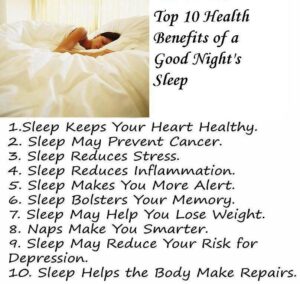Everyone knows that a good night’s sleep is as necessary as a well-balanced diet and regular exercise.
Research reveals that lack of sleep can negatively impact your brain function, hormones, and exercise performance instantly. It can increase the risk of disease in both children and adults and can even lead to weight gain. Alternatively, sleeping well can help you exercise better, be healthier, and eat less.
Over the past couple of decades, sleep quantity and quality have worsened. In fact, several people often get poor sleep. If you wish to lose weight or improve your overall health, getting a good night’s sleep is one of the most crucial things you can do.
 1. Exercise Regularly
1. Exercise Regularly
Going for a brisk walk every day won’t just help to shed the extra pounds; it will also help you sleep well at night. As per Dr. Karen Carlson, associate professor of medicine at Harvard Medical School, exercise enhances the impact of natural sleep hormones, like melatonin. A research published in the journal Sleep revealed that postmenopausal women who exercised for around hours every week fell asleep more easily than women who exercised less frequently.
However, you need to be careful regarding the timing of your exercise session. Exercising right before bedtime can be invigorating. Ideally, you should exercise in the morning. This is because exposure to bright daylight early in the morning can help to enhance your circadian rhythm.
2. Avoid Consuming Coffee Late in the Day
Caffeine has several advantages and is consumed by 9 out of 10 people in the US. Just one dose of caffeine can improve sports performance, focus, and energy.
Nevertheless, when taken late in the day, caffeine invigorates your nervous system. This can potentially prevent you from sleeping at night. A research revealed that consuming caffeine up to 6 hours before going to bed can considerably lower sleep quality.
If you wish to enjoy a good night’s sleep, you should not consume coffee or other caffeinated drinks after 4 PM. In case you get a craving for a cup of coffee in the evening or late afternoon, opt for decaffeinated coffee.
3. Reduce Long Daytime or Irregular Naps
Even though short power naps are highly beneficial, long daytime or irregular naps during the day can potentially have an adverse affect on your sleep.
Sleeping in the afternoon or evening can mess up your circadian rhythm, which means that you might face trouble sleeping at night.
A study found that taking a 30-minute or shorter nap can improve brain function during the day. However, the same study revealed that longer naps could adversely impact sleep quality and deteriorate health.
4. Stick to a Sleeping Schedule
Staying consistent regarding your waking and sleeping times can enhance sleep quality in the long run.
In a particular study, participants who had irregular sleeping habits and went to bed late on the weekends reported poor sleep quality.
Ideally, you should set aside a maximum of eight hours of sleep. The recommended amount of sleep for a healthy adult is at least seven hours. Most individuals don’t require more than eight hours in bed to attain this goal.
Go to sleep and wake up at the same time each day. Moreover, limit the difference in your sleep schedule on weekends and weeknights to a maximum of one hour. Staying consistent strengthens your body’s sleeping cycle.
If you aren’t able to sleep within around 20 minutes, you should leave your bed and do something relaxing. Play some relaxing music or read a novel. Return to your bed when you are tired.
5. Don’t Eat Late in the Evening
Snacking late at night can negatively impact your sleep quality and the natural release of melatonin and HGH. In addition, the type and quality of your late-night snack can have an impact too.
In a particular study, a carb-rich meal taken four hours before going to bed allowed people to fall asleep more quickly.
Another study interestingly revealed that a low-carb diet also improved sleep, revealing that carbs aren’t always important, particularly if you are used to having a low-carb diet.
6. Take a Relaxing Shower or Bath
Another great way to enjoy a good night’s sleep is to take a soothing shower or bath. Studies show that they can help enhance overall sleep quality and aid individuals, particularly older adults, fall asleep faster. In a particular study, taking a hot bath one and a half hour before going to bed enhanced sleep quality and allowed people to get more deep sleep.
On the other hand, if you don’t like taking a full bath in the evening, just putting your feet in lukewarm water can help induce feelings of relaxation and improve sleep.
7. Get Yourself Checked for a Sleeping Disorder
Your sleep troubles might be caused by underlying health problems.
One common problem is sleep apnea, which results in interrupted and inconsistent breathing. People suffering from this disorder stop breathing periodically while sleeping. This condition is more prevalent than you think. One review stated that 24 out of 100 males and 9 out of 100 females suffer from sleep apnea.
Other common clinically diagnosed problems entail circadian rhythm sleep-wake disorders and sleep movement disorders, which are common amongst shift workers. If you have a long history of sleep issues, you should speak to your doctor about it.
8. Improve Your Bedroom Environment
A lot of people believe that your bedroom’s environment plays a major role in helping you get a good night’s sleep. This includes noise, temperature, furniture arrangement, and external lights.
Various studies indicate that external noise can lead to poor sleep and long-term health problems.
To improve your bedroom environment, try to minimize light, external noise, and artificial light from smartphones, alarm clocks, etc. Make your bedroom a relaxing, quiet, enjoyable, and clean place. 
Wrapping Up
A good night’s sleep can significantly enhance your overall well-being and health. Alternatively, lack of proper sleep can increase the risk of heart disease, type 2 diabetes, and obesity.
So, make sure to incorporate some of the tips mentioned above to enjoy a good night’s sleep and live a better life.



One Comment